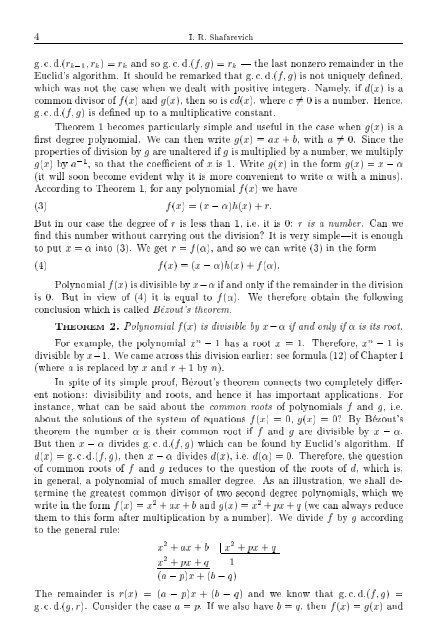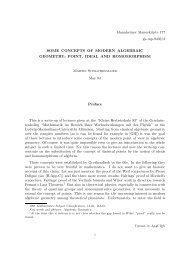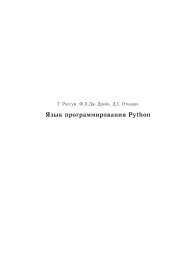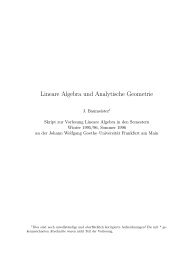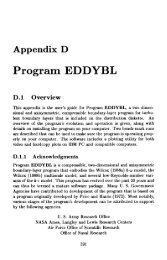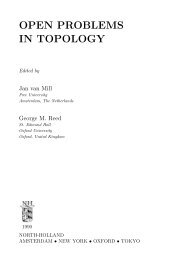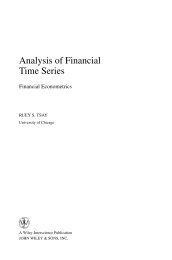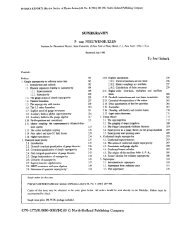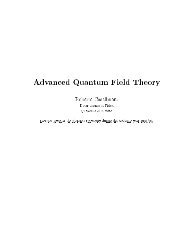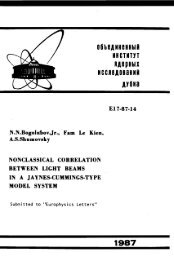SELECTED CHAPTERS FROM ALGEBRA I. R. Shafarevich Preface
SELECTED CHAPTERS FROM ALGEBRA I. R. Shafarevich Preface
SELECTED CHAPTERS FROM ALGEBRA I. R. Shafarevich Preface
You also want an ePaper? Increase the reach of your titles
YUMPU automatically turns print PDFs into web optimized ePapers that Google loves.
4 I. R. <strong>Shafarevich</strong>g: c: d:(r k;1 r k )=r k and so g: c: d:(f g) =r k | the last nonzero remainder in theEuclid's algorithm. It should be remarked that g: c: d:(f g) is not uniquely dened,which was not the case when we dealt with positive integers. Namely, ifd(x) isacommon divisor of f(x) and g(x), then so is cd(x), where c 6= 0isanumber. Hence,g: c: d:(f g) is dened up to a multiplicative constant.Theorem 1 becomes particularly simple and useful in the case when g(x) isarst degree polynomial. We can then write g(x) =ax + b, witha 6= 0. Since theproperties of division by g are unaltered if g is multiplied by anumber, we multiplyg(x) by a ;1 , so that the coecient ofx is 1. Write g(x) in the form g(x) =x ; (it will soon become evident why it is more convenient to write with a minus).According to Theorem 1, for any polynomial f(x) wehave(3) f(x) =(x ; )h(x)+r:But in our case the degree of r is less than 1, i.e. it is 0: r is a number. Can wend this number without carrying out the division? It is very simple|it is enoughto put x = into (3). We get r = f(), and so we can write (3) in the form(4) f(x) =(x ; )h(x)+f():Polynomial f(x) is divisible by x; if and only if the remainder in the divisionis 0. But in view of (4) it is equal to f(). We therefore obtain the followingconclusion which is called Bezout's theorem.THEOREM 2. Polynomial f(x) is divisible by x ; if and only if is its root.For example, the polynomial x n ; 1 has a root x = 1. Therefore, x n ; 1 isdivisible by x;1. We came across this division earlier: see formula (12) of Chapter I(where a is replaced by x and r +1by n).In spite of its simple proof, Bezout's theorem connects two completely dierentnotions: divisibility and roots, and hence it has important applications. Forinstance, what can be said about the common roots of polynomials f and g, i.e.about the solutions of the system of equations f(x) =0,g(x) =0? By Bezout'stheorem the number is their common root if f and g are divisible by x ; .But then x ; divides g: c: d:(f g) which can be found by Euclid's algorithm. Ifd(x) =g: c: d:(f g), then x ; divides d(x), i.e. d() =0. Therefore, the questionof common roots of f and g reduces to the question of the roots of d, which is,in general, a polynomial of much smaller degree. As an illustration, we shall determinethe greatest common divisor of two second degree polynomials, which wewrite in the form f(x) =x 2 + ax + b and g(x) =x 2 + px + q (we can always reducethem to this form after multiplication by anumber). We divide f by g accordingto the general rule:x 2 + ax + bx 2 + px + q 1(a ; p)x +(b ; q)j x 2 + px + qThe remainder is r(x) = (a ; p)x +(b ; q) and we know that g: c: d:(f g) =g: c: d:(g r). Consider the case a = p. If we alsohave b = q, then f(x) =g(x) and


